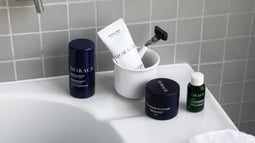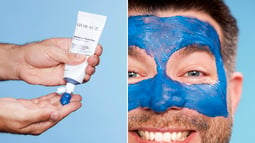

Navigating SPF Labels: How to Choose Sunscreen Effectively
Words Floriane Reynaud
Share the article on
Make sure you protect yourself from its UV rays.
In this article, we will explore the different sunscreen protection factors, understand their significance, and learn how to apply them like a true sun care expert. You’ll become so knowledgeable that you’ll be giving advice to your friends—as usual.
Summary
Why is it important to protect yourself from the sun?
The sun affects all skin tones—fair, medium, and dark. The difference lies in how quickly each reacts. The fairer the skin, the faster it reacts to the sun; the darker the skin, the slower the reaction. However, the effects remain the same.
The danger comes from UV rays—especially UVA and UVB. UVB rays cause sunburn, melanoma, and skin cancer, posing both short- and long-term risks. UVA rays, on the other hand, penetrate deep into the skin, accelerating skin aging by damaging collagen and elastin.
In short, if you want to avoid sunburn, skin cancer, and premature wrinkles, protect your skin from the sun with sunscreen.
How to Choose the Right Sun Protection Factor (SPF)?
SPF, or Sun Protection Factor, indicates the level of protection a sunscreen offers against UVB rays, which cause sunburn, melanoma, and skin cancer. This number, tested by independent laboratories under strict standards, indicates how effectively the sunscreen protects your skin. An SPF 15 filters 93% of UVB rays, SPF 30 filters 97%, and SPF 50+ filters between 98% and 99%.
In short, the higher the SPF, the better the protection. For everyday use in the city, SPF 30 is enough. That’s why we included SPF 30 sun protection in our Mattifying Face Moisturizer SPF30. It hydrates, protects, and mattifies your skin, all without leaving a white cast or greasy feel. It contains a safe mineral filter, zinc oxide.
When spending the day outdoors or lounging in direct sunlight for a few hours, go for SPF 50. Never make the mistake of exposing yourself to the sun without protection. Whether you have fair or dark skin, you’ll get sunburned if you do it even once. Worse, frequent unprotected exposure significantly increases the risk of melanoma and skin cancer.
For prolonged sun exposure, try our SPF50+ Face and Body Sunscreen. Its lightweight texture absorbs easily, even on hairy skin, and doesn’t leave a white cast. With this, you have the right sun protection for basking in the sun. It uses chemical (also called organic) filters that are ocean-friendly. An independent lab tested it—it’s also safe for your skin.
How to Properly Apply Sunscreen?
Choosing the right SPF is the first step—now you need to apply it correctly for full protection.
First, take your time applying sunscreen evenly on your body and face. Make sure every area is covered. Our Face & Body Sunscreen SPF50+ is an all-in-one solution for face and body. Its fluid texture makes it easy to apply everywhere, from legs to back, and its formula is suitable for sensitive skin, making it ideal for the face. Even though it’s sweat-resistant, if you exercise or swim, be sure to reapply afterward.
Apply your sunscreen at least 30 minutes before sun exposure. This is crucial to ensure effective protection from the moment your skin meets the sun’s rays. It allows the product to absorb properly and create a protective barrier.
For optimal protection, reapply sunscreen every 2 to 3 hours—that’s the secret to avoiding the “lobster look.” Keep in mind that factors like sweat and wind reduce sunscreen effectiveness, so don’t skimp on the amount. In short, be generous when applying sunscreen, regardless of your skin type. UVA and UVB rays are dangerous for everyone.
After tanning and showering, apply an aftersun lotion. Our Soothing Aftersun helps reduce burning sensations (which you shouldn’t have if you applied sunscreen correctly) and hydrates your skin. Not greasy, no white cast either!
By following these steps, you'll maximize sun protection and reduce the risk of skin damage. Stay safe and enjoy the sun responsibly!









